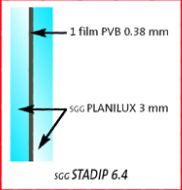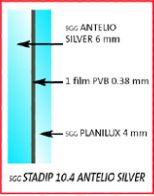Description
Laminated safety and security glass, SGG STADIP or SGG STADIP PROTECT, comprises two or more sheets of glass bonded together with one or more interlayers of polyvinyl butyral (PVB) film. SGGSTADIP glass incorporates a single PVB sheet with a nominal thickness of 0.38 mm, distinguishing it from SGG STADIP PROTECT glass which has a minimum thickness of 0.76 mm.
Laminated glasses with different levels of safety and security can be obtained by varying the number and/or thickness of each of the components. If the glass breaks, the fragments of glass are held in place by the PVB interlayer(s). In fully framed installations the broken glass retains a residual strength while awaiting replacement.
In the event of breakage, the glass fragments remain bonded to the plastic interlayer. In a fully framed conventional installation the glass fragments are held together and the glass retains a residual strength while awaiting replacement
Where can it be used
Protection in buildings is increasingly required to comply with current regulations, for insurance purposes or simply to fulfil a genuine need, especially against the risk of injury, vandalism and burglary. In homes, SGG STADIP and SGG STADIP PROTECT glasses can offer appropriate safety and security solutions to meet the combined criterion of protection, aesthetics and performance.
PRODUCT APPLICATION
Protection against injury
If the glass breaks, the fragments of glass remain bonded to the interlayer. This safety feature, which is often mandatory (for example: in public buildings, schools, creches, etc), is also ideal for residential buildings, where it protects the occupants.
The use of glass in roofs must meet safety, enhanced thermal insulation and solar protection requirements. Safety is ensured by the use of a laminated safety or security glass (inner leaf of the overhead glazing). If an object falls onto the glazing, SGG STADIP PROTECT may prevent the object from passing through the glass and also minimises the risk of fragments falling into the space below.
Depending on the composition, SGG STADIP PROTECT laminated security glass ensures that structures conform to the regulatory requirements for overhead glazing.
Guarding and balustrading
SGG STADIP or SGG STADIP PROTECT laminated safety glass has:
Residual stability in the event of breakage
Retention of the object which caused the glass to break (depending on the required safety and security level) providing that it is accurately sized, installed, supported adequately and that it complies with current regulations and requirements (BS EN12600)
SGG STADIP PROTECT has the ability to meet the P1A & P2A requirement for BS EN 356
The main areas in which laminated safety and security glass is used are: guarding, glazed partitions and sloping glazing.
Protection against vandalism and burglary
SGG STADIP PROTECT laminated security glass, installed in an appropriate frame, can be an important deterrent to ensure the security of property and occupants in a building.
• SGG STADIP PROTECT SP laminated security glass contributes to the security of businesses and offices.
Combined with additional protection, if required, this glass can be used in shop windows and doors, entrance doors and windows in offices appropriate to the specified levels of protection.
• The level of the risk and the regulatory requirements determine the necessary level of protection and thus the type of SGG STADIP PROTECT or SGG STADIP PROTECT SP laminated security glass to use. This selection is determined by the type and value of the property to be protected, the type of building (for example: building which is easy or difficult to access, private house, etc) and its location (for example: isolated premises, high-risk area, etc).
The risk must be assessed on a case by case basis and must take any insurance specifications into account.
Protection against firearms
SGG STADIP PROTECT bullet-resistant laminated security glass provides protection against armed attack (e.g. financial institutions, banks, guardrooms, official or military units, etc).
The No Splinters (NS) or minimal spall version protects against injury from splinters of glass, which may fly from the rear surface of the glass upon attack.
SGG STADIP PROTECT HS protects against bullets from handguns and rifles. SGG STADIP PROTECT HC glass protects against shotgun fire.
SGG STADIP PROTECT FS combines bullet resistance (against certain firearms) with protection against vandalism and burglary. This glass is therefore suitable for multifunctional applications requiring safety, security and protection.
Protection against explosions
Minimising the consequences of an accidental or criminal explosion involves the use of glass which protects against the pressure generated by the explosion. For industrial use, any premises located in hazardous areas should use a SGG STADIP PROTECT BS type glass.
Protection against noise
Products in the SGG STADIP range have acoustic insulation properties. They can be used in any applications requiring acoustic insulation.
SGG STADIP SILENCE laminated acoustic and safety glass can be used in applications where high acoustic insulation is essential (e.g. interpreting booths, residential areas in close proximity to airports, towns or city centres, railway lines or motorways, etc), without compromising the safety performance.
Protection against UV light
The PVB interlayer in the SGG STADIP and SGG STADIP PROTECT range filters most UV rays. It can be used to reduce the discoloration of items inside a building that are exposed to direct sunlight. (e.g. shop window displays, curtains, carpets, conservatories etc).
Glass floor panels
SGG LITE-FLOOR is a laminated safety glass which has been specially designed and sized for use in floors.
Note: The behaviour of the polyvinyl butyral (PVB) interlayer varies with temperature. SGG STADIP and SGG STADIP PROTECT are mechanically stable in a temperature range between 10°C and 45°C, inside the glass assembly .
ADVANTAGES
This laminated safety glass provides many solutions for the protection of people. If broken, the glass remains bonded to a plastic sheet and is less likely to cause injury to people or property. The plastic sheet also makes penetration more difficult.
These glass products are designed for differing levels of protection, from vandalism to burglary



